June 22-July 31, 2020 This was the final week of the summer school. The pressure was on: presentations were to be given on Thursday afternoon, and final reports from the subgroups were due on Friday, 1 p.m. Presentations Most of the … Continue reading
Author Archives: Hans Kaper
June 22-July 31, 2020 In last week’s blog post, we mentioned that the participants in the summer school had identified fifteen research questions, which had been organized under five “umbrellas”: Diseases and the Environment, Impacts of Behavior, Incorporation of Data, … Continue reading
June 22-July 31, 2020 This was the week where the rubber hit the road. Having established five “umbrella groups,” each focused on a particular theme, and grouped fifteen projects under the various umbrellas, it was time to get to work … Continue reading
June 22-July 31, 2020 This week we delved into data. Primed by the Alessandro Vespignani’s video presentation, we addressed the main topic of the summer school:Integrating observational data into mathematical models through Data Assimilation (DA). Data Assimilation Our leader Chris started the … Continue reading
We are approaching the end of week 2 — a short 4-day week because of the 4thof July holiday. Here is a summary of the past few days. This week, the focus was on modeling the COVID-19 pandemic. Here, modeling stands … Continue reading
by Yemeen Ayub “But you can’t do that, … , Mr. President?“ We were tasked with roleplaying as scientists who were having a stern conversation with policy-makers. Everyone is grinning at the humor of calling each other Sir, Ma’m, or … Continue reading
The last day of the week was devoted to several exercises and some self-reflection. Anonymous polling was part of each exercise. First exercise: Think about questions that you would like us to address, given what we have heard during the … Continue reading
Today we heard from experts (morning) and practitioners (afternoon). The experts were Codilia McGehee (MD/PhD, U Minnesota), Jack O’Brian (biomath, stat, Bowdoin College), Pauline van den Driessche (math epidemiology, U Victoria), Jianhong Wu (math epidemiology, York U). The practitioners were Andrew … Continue reading
The theme for the third day was modeling and simulation, with emphasis on COVID-19. In the morning, we discussed the report “Impact of non-pharmaceutical interventions (NPIs) to reduce COVID-19 mortality and healthcare demand” by the Imperial College COVID-19 Response Team, March … Continue reading
Today, we began our quest for questions. Report on the SIAM News articles Since few of the participants in the Summer School are familiar with the dynamics of infectious diseases and pandemics like COVID-19, it made sense to start our … Continue reading
This is the first day of the Summer School on “Dynamics, Data, and COVID-19.” The Summer School is organized by the American Institute of Mathematics (AIM) in San Jose, California, and the Mathematics and Climate Research Network (MCRN), with support … Continue reading
Consider the current coronavirus crisis. In December 2019, it became apparent that Covid-19 was threatening public health in a major way. Several mathematical models predicted how the virus would spread, and that a worldwide pandemic was a distinct possibility. Data … Continue reading
Countries’ responses to the ongoing COVID-19 pandemic have ranged from swift, decisive, and forward-thinking to delayed, contradictory, and reactionary. What can these global responses teach us about what is needed to act on climate change in an effective and equitable … Continue reading
The newly founded group ‘Computational Geoscience’ at the Geoscience Centre at University of Göttingen invites applications for the following positions: Postdoc Position for Data-intensive Methods for the Geosciences You received your PhD on a geoscientific topic with a strong methodology focus … Continue reading
We are pleased to invite you to take part to a new series of weekly webinars designed to give the opportunity to early career researchers, PhD students and Post-Docs, working on topics related to Mathematics of Planet Earth, to share their work with researchers at all levels in the … Continue reading
On April 22, 1970, Earth Day was born. Twenty million Americans — 10% of the U.S. population at the time — took to the streets, college campuses and hundreds of cities to protest environmental ignorance and demand a new way … Continue reading
Democrats in the Senate stayed up all night talking about the perils of climate change. But while there’s hope that technology, changing consumer and business practices or new policies could finally turn the tide and slow or reverse climate change, there are also good reasons to think those efforts will fail. Continue reading
![]() MPE2013 was launched at the winter meeting of the Canadian Mathematical Society in Montreal on December 7, 2013. Now, at the end of 2013, more than 140 partners are affiliated with MPE2013. “Mathematics of Planet Earth” needs to continue, and this is why MPE2013 will morph into MPE on January 1, 2014.
MPE2013 was launched at the winter meeting of the Canadian Mathematical Society in Montreal on December 7, 2013. Now, at the end of 2013, more than 140 partners are affiliated with MPE2013. “Mathematics of Planet Earth” needs to continue, and this is why MPE2013 will morph into MPE on January 1, 2014.  Continue reading
Continue reading
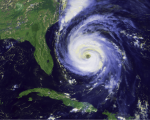 It was a hurricane season almost without hurricanes. There were just two, Humberto and Ingrid, and both were relatively wimpy, Category 1 storms. That made the 2013 Atlantic hurricane season, which ended Saturday, the least active in more than 30 years — for reasons that remain puzzling. Continue reading
It was a hurricane season almost without hurricanes. There were just two, Humberto and Ingrid, and both were relatively wimpy, Category 1 storms. That made the 2013 Atlantic hurricane season, which ended Saturday, the least active in more than 30 years — for reasons that remain puzzling. Continue reading
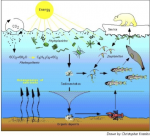 As applied mathematicians we love differential equations. So, if you are looking for an interesting set of ordinary differential equations (ODEs) with relevance for Planet Earth, you might take a look at the so-called NPZ model of biogeochemistry. Continue reading
As applied mathematicians we love differential equations. So, if you are looking for an interesting set of ordinary differential equations (ODEs) with relevance for Planet Earth, you might take a look at the so-called NPZ model of biogeochemistry. Continue reading
 Today, allow me to indulge in a bit of self-promotion on the occasion of the publication by the Society of Industrial and Applied Mathematics (SIAM) of a new textbook, “Mathematics and Climate,” co-authored by your friendly MPE Blogmaster, Hans Kaper, and my colleague, Hans Engler, at Georgetown University. Continue reading
Today, allow me to indulge in a bit of self-promotion on the occasion of the publication by the Society of Industrial and Applied Mathematics (SIAM) of a new textbook, “Mathematics and Climate,” co-authored by your friendly MPE Blogmaster, Hans Kaper, and my colleague, Hans Engler, at Georgetown University. Continue reading

The November issue of The College Mathematics Journal is a special theme issue supporting the Mathematics of Planet Earth initiative, MPE 2013. The issue is freely available to all. Of special interest is a guest editorial by Mary Lou Zeeman (Bowdoin College). It is a call to arms for the mathematics community to identify and engage, at a deeply intellectual level, with the mathematical challenges associated with decision making for sustainability. Continue reading

On Wednesday, November 6, Inez Fung will deliver a public lecture at the Berkeley City College Auditorium on the topic “Verifying Greenhouse Gas Emissions” as part of their series Not on the Test: The Pleasures and Uses of Mathematics. Continue reading

This Sunday, most of the United States and Canada changes from Daylight Saving Time (DST) to Standard Time: at 2:00 a.m. local time, clocks fall back to 1:00 a.m. Continue reading
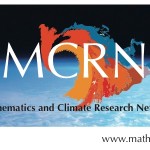
The “Mathematics and Climate Research Network” (http://www.mathclimate.org/, MCRN) held its annual meeting, October 7-12 in North Carolina.
The MCRN is a virtual organization. It brings together leading researchers across the US to study the mathematics that underlies climate science. Research is done collaboratively in focus groups over the Internet, and researchers get together once a year at the annual meeting to explore new ideas and set the agenda for upcoming activities. Continue reading
In today’s blog, I will go into one of the issues in mathematical ecology mentioned in yesterday’s blog reporting on the MBI workshop on “Sustainability and Complex Systems.” The issue came up in the discussion sessions, where the question was asked how one could apply dimension-reduction techniques to individual-based models (IBMs) and derive more manageable descriptions of ecological systems. Continue reading
During the week of September 16-20, 2013, I attended a workshop on “Sustainability and Complex Systems” at the Mathematical Biosciences Institute at Ohio State. This was the first of three workshops on the theme “Ecosystem Dynamics and Management,” organized under the umbrella of MPE2013. Continue reading
As part of the workshop cluster on Sustainable Human Environments, a preworkshop on urban planning for climate events will be sponsored by DIMACS/CCICADA as part of the Mathematics of Planet Earth 2013+ program. Continue reading
The American Geophysical Union (AGU) recently released a revised version of its position statement on climate change. Continue reading
The greater the plant density in a given area, the greater the amount of rainwater that seeps into the ground. This is due to a higher presence of dense roots and organic matter in the soil. Since water is a limited resource in many dry ecosystems, such as semi-arid environments and semi-deserts, there is a benefit to vegetation to adapt by forming closer networks with little space between plants. Continue reading
A workshop “Mathematics of Planet Earth: Challenges and Opportunities” will be held at Arizona State University, January 7-10, 2014. The workshop aims to expose students and junior researchers to the challenges facing our planet, the role of the mathematical sciences in addressing those challenges, and the opportunities to get involved in the effort. Continue reading
Weather extremes capture the public’s attention and are often used as arguments in the debate about climate change. The concern that extreme events may be changing in frequency and intensity as a result of human influences on climate is real, but the notion of extreme events depends to a large degree on the system under consideration, including its vulnerability, resiliency, and capacity for adaptation and mitigation. Continue reading
The MPE2013 Daily Blog is taking a summer break. The next post is scheduled for August 15, 2013.
The American Geophysical Union held its 2nd Annual Science Policy Conference in the Walter E. Washington Convention Center in Washington, DC, June 24-26. Continue reading
It was important for me to speak directly to your generation, because the decisions that we make now and in the years ahead will have a profound impact on the world that all of you inherit. Continue reading
MPE2013 Public Lecture — Jane Wang, Fields Institute, June 21, 2013. Continue reading

The 2013 SIAM Conference on Mathematical and Computational Issues in the Geosciences will be held in Padua, Italy, June 17-20. Continue reading
Starting June 10, the MPE2013 Daily Blog will appear Monday through Friday.
In a recent op-ed for The Post, Rep. Lamar Smith (R-Tex.) offered up a reheated stew of isolated factoids and sweeping generalizations about climate science to defend the destructive status quo. Continue reading
Looking back, the “Keeling curve” of CO${}_2$ concentrations ranks among the most significant achievements of twentieth-century science. Continue reading
The SIAM Activity Group on Dynamical Systems (SIAG/DS) held its biennial meeting (DS13) at the Snowbird Ski and Summer Resort in Snowbird, Utah, May 19-23, 2013. Continue reading
A diverse group of 42 scholars from 15 countries converged this week at BIRS for a workshop on “Non-Gaussian Multivariate Statistical Models and their Applications.” Continue reading
Releasing a ton of carbon dioxide into the atmosphere has quite a different effect on the global average temperature than releasing a ton of methane. Have you ever wondered how the effects of different greenhouse gases are compared? Continue reading

The full report on The Mathematical Sciences in 2025 from the National Academies Press is now available for download. Continue reading
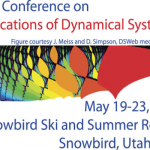
The 2013 SIAM Conference on Applications of Dynamical Systems (DS13) will be held at the Snowbird Ski and Summer Resort, Snowbird, Utah, May 19-23. Continue reading
“The science is clear,” climate scientist Emily Shuckburgh told an audience of nearly 800 people at San Francisco’s Palace of Fine Arts on March 4. Continue reading
A workshop on “Major and Neglected Diseases in Africa” was held at the University of Ottawa, May 6-10, 2013. Continue reading
An interesting collection of web videos from the Energy Systems Week at the Isaac Newton Institute. Continue reading
Commodities and energy markets continue to grow in activity and influence. Because of the growing concern about environmental issues inherent to the production and consumption of energy, quantitative insights into these marketplaces are crucial for sustainable development and policy making with respect to climate change. Continue reading
Infographics (short for Information Graphics) are graphic visual representations of information, data or knowledge. They are intended to present complex information quickly and clearly. If done right, they enhance our visual system’s ability to see patterns and trends. Continue reading
It is well known that sea ice has a significant influence on the Earth’s climate system. While global warming causes Arctic sea ice to melt at a measurable and significant rate, sea ice surrounding Antarctica has actually expanded, with record extent in 2010. How can this somewhat paradoxical behavior be reconciled with global warming? Continue reading
Could the cold weather experienced in northern Eurasia this winter be related to the decrease in Arctic sea ice? This question is currently being debated in the media in Europe. This post shows some weather maps and links to several relevant blogs and articles. Continue reading
Assuring a sustainable future for our children and grandchildren is, arguably, the greatest challenge facing humanity and raises a plethora of scientific and mathemat- ical challenges. In the language of the Brundtland Report World Commission on Environment and Development, 1987, it means leaving for future generations the same options we have for how we want to live our lives. However, operationalizing that concept is easier said than done. Continue reading
In 1941, the Serbian mathematician Milutin Milankovitch (1879–1958) suggested that past glacial cycles might be correlated to cyclical changes in the insolation (the amount of solar energy that reaches Earth from the Sun). Continue reading

The American Physical Society (APS) now has a Topical Group on the Physics of Climate (GPC). Continue reading

In recognition of Mathematics of Planet Earth 2013, the SIAM Journal on Scientific Computing (SISC) has dedicated a special issue to Planet Earth and Big Data. Continue reading
MPE2013 is a success. It is has generated enthusiasm all over the world, and it is giving mathematics more visibility than we could have hoped for. Continue reading

The interesting “Henbury Conservation Project” was brought to my attention by Ian Noble at the JSPS Symposium on “Climate Change.” Thanks, Ian, for a very good presentation on “Land and Our Responses to Climate Change.” -HGK Continue reading

On Friday, February 23, 2013, I attended a Symposium on “Climate Change,” organized by the Japan Society for the Promotion of Science (JSPS) and co-sponsored by the AAAS, NAS, NASA, NOAA and NSF. The symposium was held at the Cosmos Club in Washington, DC. Continue reading

We are pleased to announce the 2013 AARMS Mathematical Biology Workshop to be held at Memorial University of Newfoundland, July 27-29, 2013, in St John’s, Newfoundland. Registration closes on May 17, 2013 and abstracts should be submitted by June 30, 2013. Continue reading
Perhaps you’ve seen this already, but it’s pretty amazing, and features some well-known faces: Earth from Space Sean Crowell Mathematics and Climate Research Network (MCRN) sean.m.crowell@gmail.com
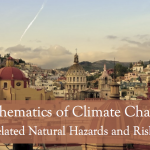
A 5-day workshop on “Mathematics of climate change, related hazards and risks” will be held at the Centro de Investigación en Matemáticas (CIMAT) in Guanajuato, Mexico, July 29-August 2, 2013. This workshop, organized as part of the global program Mathematics of Planet Earth 2013 (MPE2013), is a satellite workshop associated with the 2013 Mathematical Congress of the Americas (MCA). Continue reading
What is the role of mathematics in climate science? Climate science, like meteorology, is largely a branch of physics; as such, it certainly uses the language of mathematics. But could mathematics provide more than the language for scientific discourse? Continue reading
Earlier this week, I had the good fortune to attend a talk here in Washington, DC, by former Vice-President Al Gore on “The Future, Six Drivers of Global Change.” This is the title of his latest book, which had just appeared. The talk was sponsored by my favorite bookstore, “Politics and Prose.” Continue reading
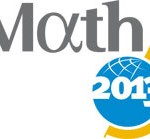
Like four years ago, my good friend David Levermore (U Maryland) and I joined the crowd that gathered on the National Mall in Washington, DC, yesterday to be part of the inauguration of President Barack Obama. It was a great … Continue reading
 Jean Baptiste Joseph Fourier (1768-1830), French mathematician and natural philosopher, did groundbreaking work in mathematics and the theory of heat. He was the first to propose that the Earth's atmosphere acts to raise the planet's temperature.
Jean Baptiste Joseph Fourier (1768-1830), French mathematician and natural philosopher, did groundbreaking work in mathematics and the theory of heat. He was the first to propose that the Earth's atmosphere acts to raise the planet's temperature.
“As a dam built across a river causes a local deepening of the stream, so our atmosphere, thrown as a barrier across the terrestrial rays, produces a local heightening of the temperature at the Earth’s surface.” Thus in 1862 John … Continue reading
 Global Warming -- Science Meets Politics
Global Warming -- Science Meets Politics
Global warming, one of the most important science issues of the 21st century, challenges the very structure of our society. It touches on economics, sociology, geopolitics, local politics, and individuals’ choice of lifestyle. For those interested in learning more about … Continue reading
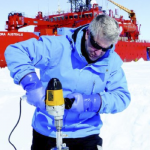 Mathematician at work - Ken Golden in Antarctica
Mathematician at work - Ken Golden in Antarctica
From the U~T San Diego, Saturday January 12, 2013 With a resume of scientific discoveries, and a track record of harrowing Antarctic adventures, University of Utah mathematician Ken Golden has stepped out of the ivory tower and onto thin ice. … Continue reading
Welcome to the MPE2013 Blog! During the coming year we intend to bring you information about the themes of MPE2013: mathematics (including statistics), climate, sustainability and the state of the planet. Some posts will report news items of general interest, … Continue reading
